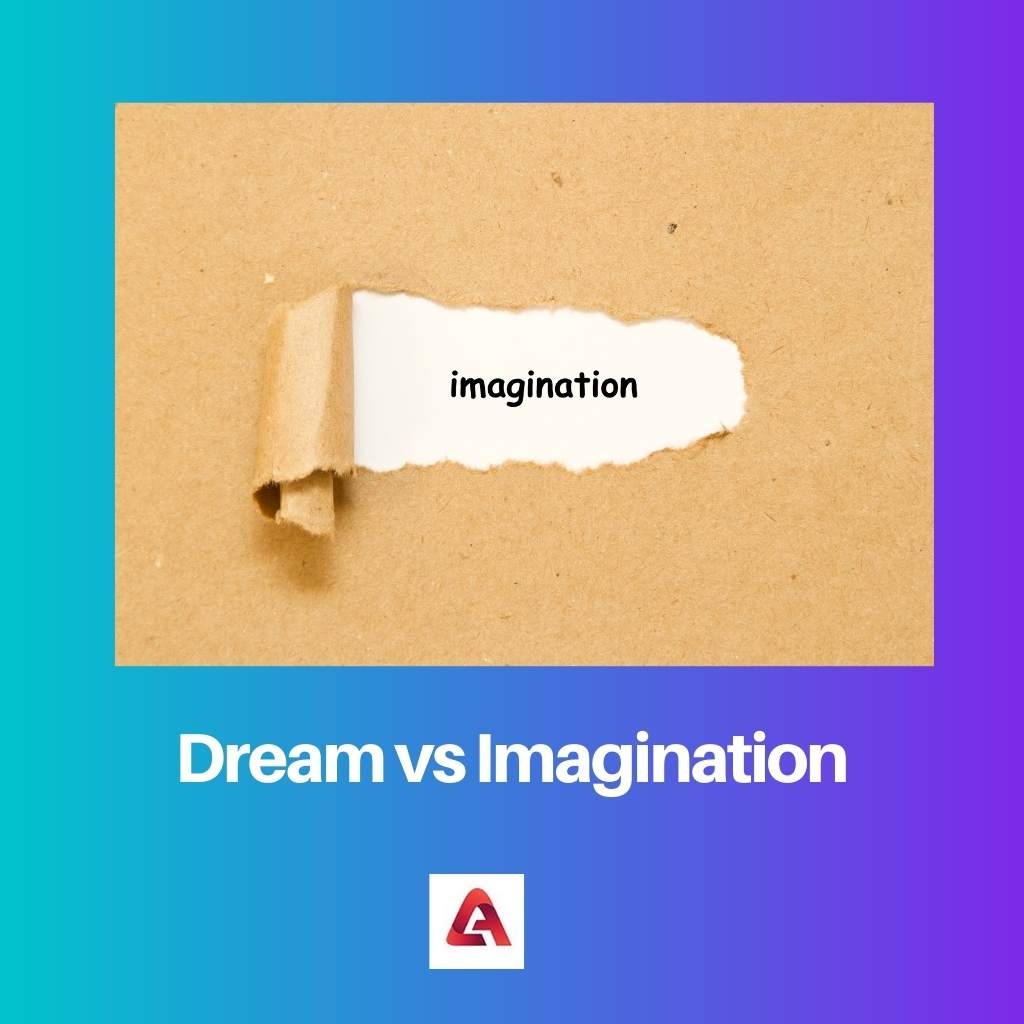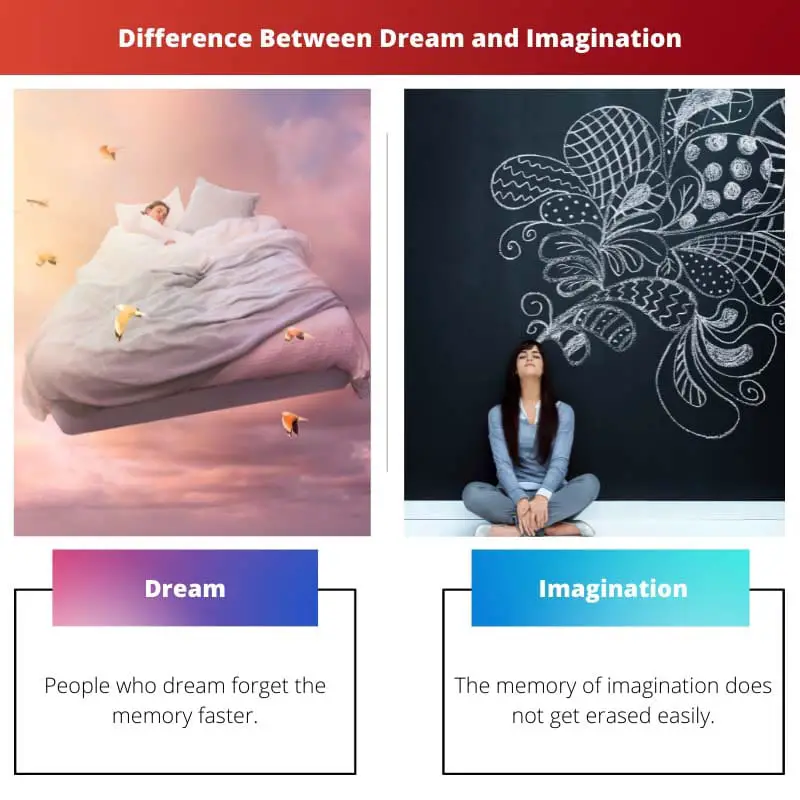Dream and imagination are two words that are closely related. However, there is a key distinction between them as well. Both these acts, imagination and dream, define mental processes, products of an individual’s mind, and state.
However, both of these acts are experimental by characteristic. Both of these acts are not influenced by or based on reality. They solely depend upon the creativity and capacity of a person. Thus, we will study the differences between two closely related terms, dream and imagination.
Key Takeaways
- Dreams are involuntary mental experiences during sleep, while imagination is the ability to form mental images or concepts not present in reality.
- Dreams are vivid, surreal, and disconnected from reality, while imagination can be more controlled and based on personal experiences and memories.
- Dreams are short-lived and forgotten, while imagination can be a continuous and conscious mental process.
Dream vs Imagination
A dream is a succession of images, ideas, emotions, and sensations that occur involuntarily in the mind during certain stages of sleep. Imagination is the faculty or action of forming new ideas, images, or concepts of external objects not present to the senses, while awake and conscious.

Dreams are unconscious events. Sometimes, they can also be inspired and influenced by any physical factor. They appear when a person is sleeping. Dreams are thought of as an act of self-reflection.
What people think, they dream. In cases, cases are interpreted, and a sense can also be drawn from them. While sleeping, not all people who fall asleep dream. After some days, the individuals can not remember the memory of dreams they saw while sleeping.
Imagination is a purely conscious event. It occurs when the mind is constantly fed with external and internal inspiration or stimulus. Imagination is done in a conscious state of mind.
It is a method of back-to-back experimentation and, sometimes, a type of exercise. The act of imagination is not treated as it is, and no interest or emphasis is put on it. Imagination can be done by any person and is a voluntary act.
The people who imagine stuff can always remember what they imagined.
Comparison Table
| Parameters of Comparison | Dream | Imagination |
|---|---|---|
| Memory retention | People who dream forget the memory faster. | The memory of imagination does not get erased easily. |
| Voluntary act | Dreaming is a non-voluntary act. | Imagination is a voluntary act. |
| Interpretation | Interpreted, and sense is drawn from it. | It is not treated as it is. No interest or emphasis is given. |
| Type | Type of self-reflection. | Type of exercise, method of constant experimentation |
| State of mind | The subconscious mind, sleeping. | The purely conscious state of mind. |
| Type of event | Unconscious events, inspired and influenced by physical factors. | In the conscious event, the mind is active. |
What is Dream?
A dream can be considered as a succession of ideas, images, sensations and emotions. These feelings occur during certain stages of sleep as an involuntary action in the mind.
The function and content of dreams have not been understood fully. These topics are religion, philosophy and science throughout recorded history.
The interpretation of dreams is an attempt to draw meaning and analyse themes from dreams and the hidden message they convey. The study of dreams in a scientific manner is called Oneirology.
When the activity of the brain is high during sleeping, and it closely resembles a state of being awake, dreams occur. They are rapid eye movements.

What is Imagination?
Imagination is the potential to stimulate and produce novel sensations, ideas and objectives in mind. However, there is no sudden involvement of the senses in imagination. It is an act where experiences are formed in a person’s mind.
The formed images can be raw, or they can be recreations of past happenings. Imagination can be based on fantastic scenes or completely invented by the mind. Sometimes they happen as a personal fantasyland as well.
Imagination is important as it helps in making the applicable knowledge while solving the toughest problems. It Is also fundamental while the learning process and integrating experience.
Imagination gradually turns into storytelling that is narrative. Storytelling can be unparalleled when the words are chosen with the utmost care, and they can evoke worlds later.

Main Differences Between Dream and Imagination
- Dreams are unconscious events and Sometimes can be inspired and influenced by physical factors as well. On the other hand, imagination is a conscious event. It takes place when the mind is fed by internal or external inspiration or stimulus.
- Dreams appear when a person is sleeping. On the other hand, imagination happens in a conscious state of mind.
- Dreams are seen as a type of self-reflection. What you think, you dream. On the other hand, Imagination is a method of constant experimentation or a type of exercise.
- Dreams can be interpreted, or a sense can be drawn from them. On the other hand, imagination is not treated as it is, and no interest is put into it as well.
- Not all people who fall asleep get to see dreams while sleeping. However, imagination is a voluntary act that can be done by any person.
- Some people can not retain the memory of a dream they saw while sleeping, some days after the incident. However, the people imagining stuff can always remember what they were up to.


The comparison of the subconscious and conscious states of mind associated with dreams and imagination offers a thought-provoking perspective.
Definitely. The article offers invaluable insights into the distinct mental states involved in dreams and imagination.
The emphasis on the voluntary and involuntary nature of dreams and imagination is exceptionally well-articulated.
I appreciate the detailed comparison table that breaks down the parameters of comparison between dreams and imagination. It really helps in understanding the differences clearly.
Yes, the comparison table is very useful. It provides a clear and concise overview of the distinctions between the two.
The explanation of the subconscious and conscious states of mind in relation to dreams and imagination is enlightening. A very informative article overall.
I found the comparison between how dreams and imagination are inspired and influenced by different factors very interesting. The article is a good read.
Absolutely, the article thoroughly covers the different states of mind associated with these processes and provides a great deal of information.
The article does a great job at explaining the differences between dreams and imagination and the key takeaways. Very informative and well-written.
I agree. It’s an in-depth analysis of the two concepts that really makes you think.
The section on Oneirology and the scientific study of dreams is intriguing. It adds a valuable scientific perspective to the discussion of dreams and imagination.
Absolutely. The scientific study of dreams adds depth to our understanding of these mental processes.
The article effectively addresses the differences between dreams and imagination. It provides a comprehensive analysis of both concepts.
I couldn’t agree more. It’s a well-rounded and informative discussion.
The explanation of dreams as unconscious events and imagination as a conscious event is well articulated. It helps in distinguishing between the two concepts effectively.
The importance of imagination in problem-solving and storytelling is excellently conveyed in this article. A stimulating read.
I agree. The article does a great job of highlighting this fundamental distinction.
The part discussing the interpretation of dreams and the scientific study of Oneirology is fascinating. It adds a deeper understanding to the concept of dreams.
The different states of mind associated with dreams and imagination are explained exceptionally well in this article. It’s enlightening.
I completely agree. The scientific study of dreams is a captivating subject that has intrigued many throughout history.
This article provides valuable insight into the memory retention differences between dreams and imagination. It’s a thought-provoking read.
I couldn’t agree more. The memory retention aspect offers an intriguing perspective on these mental processes.
The explanation of the scientific study of dreams and imagination is very informative. It adds depth to our understanding of these mental processes.
Absolutely. The scientific insights provided in the article enhance the discussion of dreams and imagination.
The section discussing the importance of imagination in problem-solving and storytelling is particularly intriguing. Well-written and informative.